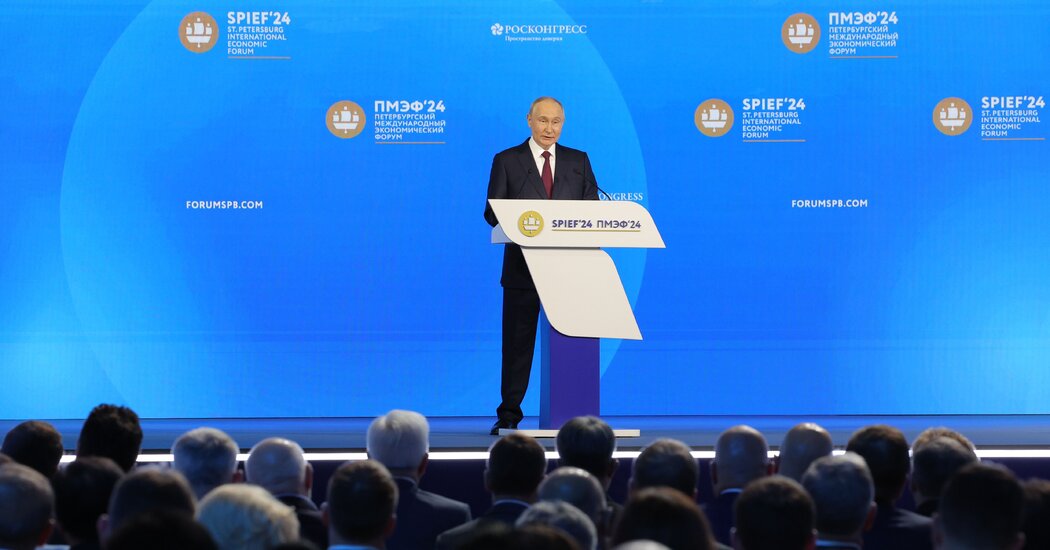President Vladimir V. Putin of Russia said on Friday that even the combined arsenals of Europe and the United States would be no match for Russia in a nuclear confrontation, but “I hope that will never happen.”
He argues that Moscow's dominance in the war in Ukraine makes such a dire scenario unlikely.
“Nuclear weapons can be used in exceptional circumstances, when state sovereignty and territorial integrity are threatened. I don't think that has happened yet,” Putin told a packed audience of Russian elites and foreign dignitaries during the main four-day St. Petersburg International Economic Forum.
Mr. Putin said in his speech, President Biden in Europe Marking the 80th anniversary of the D-Day landings, when Allied forces stormed the Normandy beaches and ultimately defeated Nazi Germany, Biden said Russia's offensive in Ukraine meant the stakes were just as high today, suggesting the voices of the fallen “are calling us” to defend Western values.
Mr. Putin, who always gives a lengthy speech at the annual gathering in St. Petersburg on Russia’s domestic and foreign affairs, said the Russian economy was growing despite a barrage of Western sanctions, that Russia was building an alternative to the U.S.-dominated global financial order and that Moscow’s armed forces had the upper hand on the battlefield.
“Mr. Putin is a master of promoting optimism, it’s a whole strategy — in Russia today, optimism is the official religion and the mandatory state ideology,” said Kirill Rogov, a former adviser to the Russian government who now heads Re: Russia, a policy research institute in Vienna. He noted that many of the positive economic indicators were driven by massive government spending on the defense industry.
Because of the large number of foreign representatives at the forum, Putin's tone tended to be more cautious than when he addresses a domestic audience. The forum's moderator, prominent political scientist Sergei Karaganov, a hawk, repeatedly urged Putin to agree that the nuclear option was the best way to win the war and that Russia should “point a nuclear pistol to the temple of the West.”
In 1993, Russia abandoned the Soviet Union’s no-first-use nuclear pledge, fearing that its weakened military would be unable to deter a U.S. attack, no matter how likely it was. While noting that Russia’s nuclear policy could change, Putin brushed off Karaganov’s comments.
“We don't have to do that,” he said, referring to the use of nuclear weapons as a last resort to safeguard national sovereignty, “because our armed forces have not only accumulated experience but also improved their combat effectiveness.”
Putin said the threat of saber rattling was counterproductive, even though Western countries accused him of doing so as early as 2022, when the war situation was not favorable to Russia, and again recently after the United States allowed Ukraine to use American weapons against Russian military targets. “I hope that everyone will not talk about the possibility of using nuclear weapons in vain,” he said.
When Karaganov asked the president whether it was possible to resolve the issue through negotiations, even with what the host called unreliable interlocutors such as the West and Ukraine, Putin quoted Stalin, saying sometimes there was no choice. Putin also reiterated his view that Ukraine's government was illegitimate because President Volodymyr Zelensky's five-year term had expired and new elections had been delayed by the war.
Putin also said any peace treaty would have to be negotiated in accordance with previous agreements reached in Minsk and Istanbul, both of which failed to stop the conflict.
Some Russian commentators took exception to Zelensky's participation in D-Day commemorations on Friday, to which Russia was not invited, despite its important Allied role in World War II. Olga Skabeeva, a prominent propagandist for Russian state television, mocked Biden in a post on the Telegram messaging app, saying “he entered a trance and made contact with the spirits of fallen veterans of World War II.”
Others, however, pointed to the changes at the St. Petersburg International Economic Forum as a sign of how deeply Russia’s 2022 invasion of Ukraine has isolated the country. That has left the Kremlin desperate for any allies, even those of Afghanistan’s Taliban rulers, who Moscow once considered a terrorist group. Neither China nor India, both major buyers of Russian oil, sent a high-level delegation.
“Once known as the ‘Russian Davos,’ the forum included elected presidents and CEOs of major multinational corporations, but this year’s guest list looked decidedly more like war criminals,” Novaya Gazeta, an independent newspaper distributed outside of Russia, wrote in a summary of the event. The paper further noted that “the presidents of Bolivia and Zimbabwe were the only heads of state in attendance,” while the unpopular terrorist group the Taliban was happy to be invited anywhere.
One of the few exciting events at this year's forum was the first appearance by Putin's two adult daughters on a panel discussion, which usually features members of Russia's elite.
The two women use different surnames, and the president has repeatedly refused to publicly acknowledge Maria Vorontsova (39) and Katerina Tikhonova (37) as his daughters, despite the fact that they both hold important positions in public institutions.
Tikhonova, who first came into the public eye several years ago by competing in an international acrobatic rock-and-roll dance competition, spoke remotely to a panel Thursday about efforts to replace imports with Russian products, a longtime pet project of Putin. Her sister, Vorontsova, spoke Friday about the use of biotech innovations. Neither has been identified as Putin's children.
Milana Mazaeva and Alina Lobzina contributed to this article.









